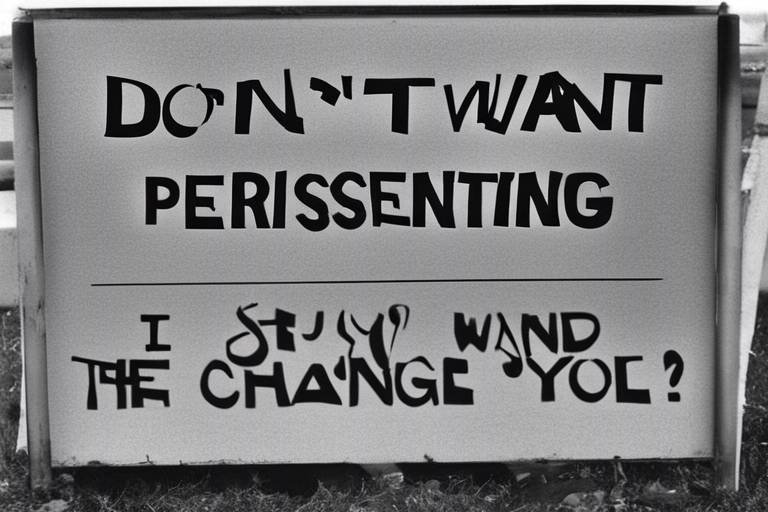Does Ontology Provide a Basis for Reality?
When we dive into the intriguing world of ontology, we’re not just wandering through abstract concepts; we’re exploring the very fabric of reality itself. But what exactly is ontology? It’s a branch of philosophy that grapples with the fundamental nature of being and existence. Think of it as the philosophical toolkit we use to dissect what it means to exist. But does this toolkit actually provide a solid foundation for understanding reality? In this article, we’ll peel back the layers of ontology and examine its role in shaping our perception of what is real.
At its core, ontology is about asking the big questions: What entities exist? How do they interact? And what does it mean for something to be? These questions have puzzled thinkers for centuries, and the answers are not always straightforward. Imagine trying to build a house without a blueprint; that’s what it feels like to navigate reality without a solid ontological framework. By establishing a structure for understanding existence, ontology helps us make sense of the chaos around us.
Furthermore, ontology doesn’t just float in the ether of philosophical thought; it has concrete implications in various fields. For instance, in computer science, ontologies are used to create frameworks that help machines understand and process information in a way that mimics human comprehension. This practical application showcases how ontology can bridge the gap between abstract philosophy and real-world functionality. But does this mean ontology provides an undeniable basis for reality? That’s where the debate gets heated.
Many philosophers argue that ontology is essential for grounding our understanding of reality. They suggest that without a clear ontological perspective, our grasp of existence would be flimsy at best. On the other hand, critics contend that ontology can sometimes lead us down a rabbit hole of speculation, distancing us from the tangible aspects of life. It’s a bit like trying to catch smoke with your bare hands—frustrating and elusive.
To truly appreciate the role of ontology in our understanding of reality, we need to consider the historical context in which it has developed. From Aristotle’s early musings on substance to contemporary debates about realism and anti-realism, ontology has evolved significantly. Each philosophical era has added layers of complexity to our understanding of existence, making it a rich field ripe for exploration.
In conclusion, while ontology provides a crucial framework for examining reality, it’s essential to recognize that it may not offer all the answers. The interplay between ontology and reality is complex, filled with nuances that challenge our perceptions. As we continue to explore these philosophical waters, we may find that the journey itself is just as important as the destination.
- What is the main focus of ontology? Ontology primarily studies the nature of being and existence, exploring what entities exist and how they relate to each other.
- How does ontology differ from metaphysics? While both fields deal with existence, ontology specifically focuses on the nature of being, whereas metaphysics encompasses a broader range of questions about reality, including the nature of objects, time, and space.
- Can ontology be applied in practical fields? Yes, ontology has practical applications in areas like computer science, where it helps create frameworks for information processing.
- What are some critiques of ontology? Critics argue that ontology can lead to speculative thinking that may not reflect tangible reality, making it difficult to apply in everyday contexts.

Understanding Ontology
Ontology, at its core, is a fascinating branch of philosophy that dives deep into the essence of being and existence. Imagine standing at the edge of a vast ocean, looking out at the horizon. Just as you ponder the depths and mysteries of the water before you, ontology invites us to explore the fundamental questions of what it means to exist. This philosophical inquiry dates back to ancient times, with roots in the works of thinkers like Aristotle, who laid the groundwork for understanding categories of being. Aristotle's ontology categorized entities into substances and attributes, providing a framework that has influenced countless philosophers throughout history.
As we journey through the ages, ontology has evolved, intertwining with metaphysics, epistemology, and even ethics. It raises profound questions: What is the nature of reality? Are the things we perceive truly real, or are they mere illusions? These queries are not just academic; they shape our understanding of the world and our place within it. For instance, consider how different cultures perceive existence. Some may see reality as a singular, unified whole, while others might view it as a tapestry woven from diverse threads of experience. This diversity underscores the significance of ontology in philosophical discourse.
Furthermore, ontology is not merely a theoretical exercise; it has practical implications in various fields. In computer science, for instance, ontological frameworks help organize information, enabling machines to understand and process data more effectively. This intersection of ontology and technology illustrates how our understanding of existence can influence real-world applications. By creating structured representations of knowledge, ontologies facilitate communication between systems, making them invaluable in areas like artificial intelligence and data management.
In summary, ontology serves as a foundational pillar in philosophy, guiding us through the complex landscape of existence. Its historical significance, coupled with its practical applications, makes it a vital area of study. As we delve deeper into the nuances of ontology, we begin to appreciate its profound impact on our understanding of reality itself. So, the next time you ponder your place in the universe, remember that ontology is there, quietly shaping the very framework of your thoughts.

The Role of Ontology in Philosophy
Ontology is not just a dusty corner of philosophy; it's like the backbone that supports the entire structure of philosophical thought. Imagine trying to build a house without a solid foundation—everything would crumble! In the same way, ontology provides the essential framework for understanding various philosophical inquiries about existence and reality. It serves as the starting point for grappling with questions like "What does it mean to exist?" and "What categories of being are there?"
At its core, ontology examines the fundamental categories of being and their relationships. This exploration is crucial because it affects how we approach other branches of philosophy, such as metaphysics and epistemology. For instance, if we define existence in a particular way, it can influence our understanding of knowledge and how we perceive the world around us. Think of it as a map; depending on how you draw the lines of existence, the paths you take in understanding reality will differ.
Moreover, ontology intersects with various philosophical discussions, shaping debates on topics like the nature of universals and particulars, the existence of abstract objects, and the essence of identity. These discussions can lead to profound implications, even affecting fields such as ethics and aesthetics. For example, if one adopts a realist ontology, they might argue that moral truths exist independently of human beliefs, while an anti-realist might contend that moral values are merely social constructs.
Here’s a quick look at how ontology interacts with other philosophical branches:
| Philosophical Branch | Relation to Ontology |
|---|---|
| Metaphysics | Studies the nature of reality and existence, often relying on ontological categories. |
| Epistemology | Explores the nature and scope of knowledge, influenced by ontological assumptions about existence. |
| Ethics | Considers the existence of moral truths, which can depend on ontological views. |
| Aesthetics | Examines the nature of beauty and art, often influenced by ontological perspectives on existence. |
In essence, ontology is the lens through which we view the world. It shapes our understanding of everything from the simplest objects in our daily lives to the most complex philosophical concepts. Without a clear ontological framework, our philosophical discussions can become muddled and confusing, like trying to navigate a foggy landscape without a compass. Thus, ontology is not just an abstract concept; it plays a vital role in our quest for knowledge and understanding.
As we delve deeper into the realm of ontology, we uncover its significance not only in philosophy but also in various practical applications, such as computer science and information systems. This highlights how ontology bridges the gap between theoretical inquiry and real-world applications, demonstrating its importance across multiple domains.
- What is ontology? Ontology is the philosophical study of the nature of being, existence, and reality.
- How does ontology relate to metaphysics? Ontology is a subset of metaphysics that focuses specifically on the categories of being and their relationships.
- Why is ontology important in philosophy? Ontology provides the foundational framework for understanding existence, which influences other branches of philosophy like epistemology and ethics.
- Can ontology be applied in practical fields? Yes, ontology has applications in fields like computer science, particularly in data modeling and information systems.

Ontology vs. Metaphysics
When diving into the depths of philosophy, one often encounters the terms ontology and metaphysics. While they are frequently used interchangeably, they actually address different aspects of our understanding of reality. To put it simply, ontology is the study of being and existence, focusing on what entities exist and their relationships. On the other hand, metaphysics is a broader field that encompasses ontology but also delves into the fundamental nature of reality itself, including concepts like time, space, causality, and possibility.
To illustrate this distinction, think of ontology as a detailed map of a city—showing the various neighborhoods, landmarks, and roads—whereas metaphysics is akin to a guidebook that explains not only the map but also the underlying principles of how the city operates. This analogy highlights that while ontology provides a framework for understanding what exists, metaphysics seeks to explain why and how those entities exist in the first place.
Ontology answers questions such as:
- What kinds of things exist?
- What is the nature of existence?
- How do different entities relate to each other?
Metaphysics, in contrast, tackles questions like:
- What is the nature of time and space?
- What does it mean for something to cause another thing?
- Is there a reality beyond our perception?
It’s crucial to note that ontology can be seen as a subset of metaphysics. For instance, when discussing the existence of abstract entities like numbers or properties, we are engaging in ontological inquiry. However, when we start to question the nature of these entities or how they interact with the physical world, we transition into metaphysical territory.
Moreover, the interplay between ontology and metaphysics leads to fascinating debates in philosophical circles. Some philosophers argue that a robust ontological framework is necessary for any metaphysical claims to hold water. Others contend that metaphysical assumptions can shape our ontological perspectives. This dynamic relationship creates a rich tapestry of thought that continues to evolve.
In conclusion, while ontology and metaphysics are intertwined, they serve distinct purposes in the philosophical landscape. Understanding their differences not only enhances our grasp of philosophical discourse but also enriches our comprehension of existence itself.

Key Figures in Ontology
Ontology has been shaped and defined by a myriad of influential thinkers throughout history. These philosophers have laid the groundwork for our contemporary understanding of existence, being, and reality. Among the most notable figures is Aristotle, whose work in the Metaphysics established a foundational framework for ontological inquiry. He introduced the concept of substance, arguing that the essence of a thing is what makes it what it is, a notion that resonates through centuries of philosophical thought.
Another pivotal figure is Immanuel Kant, who revolutionized ontology by introducing the idea that our understanding of reality is shaped by our perceptions. In his Critique of Pure Reason, Kant posited that while we can know phenomena (the world as we experience it), the noumena (the world as it is in itself) remain largely inaccessible. This distinction has profound implications for how we approach ontological questions, emphasizing the limits of human understanding.
Moving into the 20th century, Martin Heidegger made significant contributions with his existential approach to ontology. In Being and Time, he explored the concept of 'Being' itself, urging us to consider our own existence and our relationship with the world around us. Heidegger’s emphasis on 'Dasein'—the experience of being—has encouraged a more introspective view of ontology, one that prioritizes human experience and existence over abstract theorizing.
Additionally, Giorgio Agamben and Jean-Luc Marion have brought contemporary perspectives to the field. Agamben's work on the state of exception and the relationship between law and being challenges traditional ontological frameworks, while Marion’s exploration of the saturated phenomenon offers a fresh take on how we understand presence and absence in our reality.
These thinkers, among others, have not only contributed to the academic discourse but have also influenced various fields, including theology, sociology, and even computer science. Their ideas continue to provoke thought and debate, ensuring that ontology remains a dynamic and evolving field. The contributions of these key figures illustrate the rich tapestry of thought that informs our understanding of existence and the nature of reality.
In summary, the landscape of ontology is dotted with influential philosophers who have each brought unique perspectives and insights. Their collective work encourages us to continually question and explore the essence of being, existence, and the reality we inhabit.
- What is ontology? Ontology is a branch of philosophy that studies the nature of being, existence, and the categories of being.
- How does ontology differ from metaphysics? While ontology is concerned specifically with the nature of being, metaphysics encompasses a broader range of philosophical inquiries, including the nature of reality and the universe.
- Who are some key figures in ontology? Notable figures include Aristotle, Immanuel Kant, Martin Heidegger, Giorgio Agamben, and Jean-Luc Marion.
- Why is ontology important? Ontology helps us understand the fundamental nature of existence, which can influence various fields such as science, theology, and information systems.

Contemporary Ontological Debates
In today's philosophical landscape, ontological debates have taken center stage, sparking intense discussions among scholars and thinkers. These debates often revolve around the fundamental question: What is the nature of reality? As we peel back the layers of existence, we encounter two prominent camps: realism and anti-realism. Realists assert that a mind-independent reality exists, while anti-realists argue that reality is contingent upon our perceptions and interpretations. This dichotomy is not merely academic; it influences how we understand everything from science to ethics.
One of the most captivating aspects of contemporary ontological debates is the emergence of realism vs. anti-realism as a defining theme. Realism, in its various forms, posits that entities exist independently of our thoughts or beliefs. This perspective can be further divided into subcategories such as scientific realism, which holds that scientific theories accurately describe the world, and metaphysical realism, which claims that there is an objective reality that remains unchanged regardless of human perception.
On the flip side, we have anti-realism, which encompasses a range of positions that challenge the notion of an independent reality. For instance, constructivism suggests that our understanding of reality is constructed through social processes and cultural contexts. This perspective raises intriguing questions: If reality is a construct, how do we navigate truth? Can we ever truly know the world as it is, or are we forever trapped in our subjective interpretations?
Moreover, the debate extends into the realms of metaphysics and epistemology, where questions about the nature of knowledge and existence intertwine. Some philosophers argue that ontological commitments should be minimal, advocating for a more pragmatic approach to existence. This is where the concept of ontological parsimony comes into play, suggesting that we should not multiply entities beyond necessity. In simpler terms, if we can explain phenomena without invoking complex ontological frameworks, why complicate matters?
Another significant area of discussion involves the implications of quantum mechanics on ontology. The peculiarities of quantum phenomena challenge our conventional notions of reality, leading to debates about whether particles exist independently or only when observed. This intersection of physics and philosophy has led to the rise of quantum realism, which posits that the quantum world fundamentally alters our understanding of existence.
In summary, contemporary ontological debates are rich and multifaceted, reflecting our ongoing struggle to comprehend the essence of reality. As we engage in these discussions, it's crucial to remain open-minded and consider the implications of our ontological commitments. The answers may not be straightforward, but the journey of exploration is where the excitement lies.
- What is ontology? Ontology is the philosophical study of being, existence, and the nature of reality.
- What are the main debates in contemporary ontology? The primary debates include realism vs. anti-realism, the impact of quantum mechanics, and ontological parsimony.
- How does ontology relate to other fields? Ontology influences various disciplines, including metaphysics, epistemology, and even computer science through the development of ontological frameworks.
- Why is ontology important? Understanding ontology helps us navigate complex questions about existence, knowledge, and the nature of reality itself.

Applications of Ontology
When we think about ontology, it often feels like we're diving into deep philosophical waters, but the truth is, ontology isn't just for academics or philosophers lost in thought. In fact, ontology has practical applications that ripple through various fields, shaping how we understand and interact with the world around us. One of the most prominent areas where ontology shines is in computer science, particularly in the realm of information systems and artificial intelligence.
To put it simply, ontology in computer science helps us create a structured framework that defines the relationships between different concepts. Imagine trying to organize a massive library without a catalog system. Books would be everywhere, and finding the right one would be a nightmare! Ontologies act like that catalog, providing a way to classify and relate information systematically. This is particularly crucial in areas like semantic web technologies, where the goal is to make data machine-readable.
For instance, ontologies enable data interoperability, allowing different systems to work together more effectively. When different databases use a common ontology, it becomes much easier to share and integrate data. This is vital in industries like healthcare, where patient information needs to be shared across various platforms while maintaining accuracy and privacy. By using ontological frameworks, healthcare providers can ensure that everyone is on the same page, literally and figuratively!
Moreover, in the field of artificial intelligence, ontologies help in the development of knowledge representation systems. These systems use ontologies to create a structured understanding of the world, enabling machines to interpret and reason about information in a human-like manner. For example, virtual assistants like Siri or Alexa rely on ontological structures to understand user queries and provide relevant responses. Without these frameworks, they would struggle to grasp the nuances of human language and intention.
But the applications of ontology don't stop there! In business intelligence, companies use ontologies to analyze vast amounts of data and extract meaningful insights. By defining the relationships between different data points, organizations can identify trends, make predictions, and ultimately drive better decision-making. This is akin to having a map that guides you through a dense forest—without it, you might wander aimlessly, but with it, you can navigate with confidence.
In education, ontologies can also play a role in enhancing learning experiences. By structuring knowledge domains, educators can create more effective curricula and learning resources that cater to diverse student needs. Imagine a classroom where every student has a personalized learning path, guided by a well-defined ontology of knowledge. This approach not only enriches the learning experience but also fosters a deeper understanding of complex subjects.
In summary, ontology is more than a philosophical concept; it's a powerful tool that influences various practical domains. From improving data interoperability in healthcare to enhancing artificial intelligence capabilities, the applications of ontology are vast and impactful. As we continue to navigate an increasingly complex world, the role of ontology in shaping our understanding and interaction with reality remains crucial.
- What is ontology? Ontology is a branch of philosophy that studies the nature of being and existence, focusing on what entities exist and how they can be categorized and related.
- How does ontology apply to computer science? Ontology provides structured frameworks for organizing information, enabling better data interoperability and knowledge representation in areas like artificial intelligence.
- Can ontology enhance learning experiences? Yes, by structuring knowledge domains, ontology can help educators create more effective curricula and personalized learning paths for students.
- What industries benefit from ontology? Ontology is beneficial in various industries, including healthcare, artificial intelligence, business intelligence, and education.

Critiques of Ontological Approaches
Ontology, while a fascinating field of study, is not without its critics. Various philosophical perspectives have raised important questions about the validity and utility of ontological frameworks. One of the main critiques revolves around the idea that ontology can sometimes become overly abstract, distancing itself from the tangible experiences of everyday life. Critics argue that when philosophers delve too deeply into the nature of being, they may lose sight of the very essence of what it means to exist in a practical sense. This disconnection can lead to a form of intellectual elitism, where discussions become so esoteric that they fail to resonate with the general public.
Another significant critique comes from the realm of phenomenology. Phenomenologists, such as Edmund Husserl and Martin Heidegger, emphasize the importance of subjective experience. They argue that traditional ontological approaches often neglect the lived experiences of individuals. Instead of focusing solely on abstract entities, phenomenology encourages a return to the 'things themselves'—the first-person perspective of existence. This challenge prompts ontologists to reconsider how their frameworks can incorporate or perhaps even prioritize human experience over abstract categorization.
Moreover, the postmodern critique adds another layer of complexity to the discussion. Postmodern thinkers, including Jacques Derrida and Michel Foucault, are skeptical of grand narratives that claim to provide absolute truths about existence. They argue that ontology often attempts to establish definitive categories and hierarchies that can lead to exclusion and marginalization. This perspective urges a more fluid understanding of being, one that recognizes the multiplicity and diversity of experiences rather than imposing a one-size-fits-all framework. As a result, postmodern critiques challenge ontologists to embrace ambiguity and uncertainty in their inquiries.
To illustrate these critiques further, consider the following table that summarizes key critiques of ontological approaches:
| Philosophical Perspective | Main Critique | Proposed Alternative |
|---|---|---|
| Phenomenology | Neglect of lived experience | Focus on subjective experience |
| Postmodernism | Overreliance on grand narratives | Embrace of multiplicity and ambiguity |
| Critical Theory | Potential for elitism and exclusion | Incorporation of social justice perspectives |
In addition to these critiques, ontology faces challenges from critical theory, which emphasizes the importance of social context and power dynamics in shaping our understanding of reality. This approach argues that ontological frameworks can inadvertently reinforce social hierarchies and power structures. Therefore, it calls for a more inclusive and reflective approach that considers how our understanding of being is influenced by societal factors.
In conclusion, while ontology provides valuable insights into the nature of existence, it is essential to remain aware of its limitations and critiques. Engaging with these challenges not only enriches ontological discussions but also fosters a more comprehensive understanding of reality that incorporates diverse perspectives and experiences.
- What is ontology? Ontology is a branch of philosophy that studies the nature of being, existence, and reality.
- How does ontology differ from metaphysics? While ontology focuses specifically on the nature of being, metaphysics encompasses a broader range of questions about the nature of reality, including concepts like time, space, and causality.
- Why is ontology important? Ontology helps us understand the fundamental categories and structures that shape our perception of reality, influencing various fields such as science, art, and technology.
- What are some criticisms of ontology? Critics argue that ontology can be overly abstract, neglect lived experiences, and reinforce social hierarchies.

Challenges from Phenomenology
Phenomenology, as a philosophical movement, offers a compelling critique of traditional ontological assumptions. At its core, phenomenology emphasizes the importance of human experience and consciousness, suggesting that our understanding of reality is deeply rooted in how we perceive and interpret our surroundings. This perspective challenges the ontological focus on abstract entities and categories, arguing instead that the essence of being is found in lived experiences.
One of the primary challenges posed by phenomenology is its insistence on the subjectivity of experience. Unlike ontology, which often seeks to establish a universal framework for understanding existence, phenomenology highlights the variability of individual experiences. This raises a crucial question: Can there be a single, objective reality if our perceptions of it are inherently subjective? For instance, consider how two individuals can witness the same event yet recall it in vastly different ways. This subjectivity undermines the ontological claim that entities exist independently of our perceptions.
Moreover, phenomenology introduces the concept of intentionality, the idea that consciousness is always directed towards something. This challenges ontological frameworks that treat existence as a static state. Instead, phenomenology posits that being is dynamic and relational, constantly shaped by our interactions with the world. This perspective invites us to reconsider the nature of reality itself: Is reality merely a collection of objects, or is it a tapestry woven from the threads of our experiences?
Furthermore, phenomenology's focus on the first-person perspective emphasizes the importance of context and situation in shaping our understanding of being. This leads to the assertion that ontology may overlook essential aspects of existence that cannot be captured through abstract definitions. For instance, the richness of human emotions, social interactions, and cultural backgrounds play a significant role in how we define and experience reality. Thus, phenomenology challenges ontologists to expand their frameworks to include these vital dimensions.
To illustrate this divergence, consider the following table that contrasts key aspects of ontology and phenomenology:
| Aspect | Ontology | Phenomenology |
|---|---|---|
| Focus | Abstract entities and categories | Human experience and consciousness |
| Nature of Reality | Static and independent | Dynamic and relational |
| Perspective | Objective and universal | Subjective and contextual |
| Key Concept | Existence of entities | Intentionality of consciousness |
In conclusion, the challenges posed by phenomenology to ontological thought are profound and multifaceted. By prioritizing subjective experience and the dynamic nature of being, phenomenology invites us to rethink our assumptions about reality. As we continue to explore these philosophical landscapes, we must ask ourselves: How can we reconcile the objective frameworks of ontology with the rich, subjective tapestry of human experience?
- What is phenomenology? Phenomenology is a philosophical approach that emphasizes the study of conscious experience from the first-person perspective.
- How does phenomenology differ from ontology? While ontology focuses on the nature of being and existence, phenomenology prioritizes human experience and the subjective interpretation of reality.
- Why is subjectivity important in understanding reality? Subjectivity highlights that each individual's perception of reality can differ, suggesting that reality is not a fixed entity but shaped by personal experiences.

Postmodern Perspectives on Ontology
Postmodernism, with its characteristic skepticism towards grand narratives, brings a refreshing yet challenging lens to the traditional study of ontology. It questions the very foundations of what we consider "reality" and "truth," suggesting that these concepts are not universal but rather constructed through cultural and social contexts. In this light, ontology is seen not as a definitive account of being, but as a pluralistic framework that allows for multiple interpretations of existence.
One of the pivotal ideas within postmodern thought is the rejection of the notion that there is a single, objective reality. Thinkers like Jacques Derrida and Michel Foucault emphasize the fluidity of meaning and the instability of language, arguing that our understanding of existence is shaped by power dynamics and historical contexts. This perspective leads to a more fragmented view of ontology, where identities and truths are seen as contingent rather than fixed.
Moreover, postmodernism challenges the ontological commitments that have been dominant in modern philosophy. It questions the significance of categories and distinctions that have traditionally been used to define existence. For example, the binary oppositions of presence/absence or subject/object are scrutinized, revealing how these distinctions can obscure the complexities of reality. In a postmodern framework, the idea of a stable essence or being is replaced by a focus on processes, relations, and contexts.
In practical terms, this has profound implications for various fields, including art, literature, and even science. In literature, for instance, postmodern authors often play with narrative structures, blurring the lines between fiction and reality, which reflects the ontological uncertainty they promote. Similarly, in the realm of science, the idea that knowledge is objective is increasingly challenged, suggesting instead that scientific truths are also subject to interpretation and context.
To summarize, postmodern perspectives on ontology encourage us to embrace complexity and ambiguity. They invite us to reconsider our assumptions about reality and existence, urging us to recognize that our understanding is always influenced by the cultural and historical narratives we inhabit. This shift not only enriches philosophical discourse but also opens up new avenues for exploring the nature of being in a world that is, perhaps, more interconnected and multifaceted than we previously imagined.
- What is ontology? Ontology is a branch of philosophy that studies the nature of being, existence, and reality.
- How does postmodernism influence ontology? Postmodernism challenges traditional notions of objective reality and emphasizes the constructed nature of truth and meaning.
- Who are some key figures in postmodern philosophy? Notable figures include Jacques Derrida, Michel Foucault, and Jean-François Lyotard.
- What are the implications of postmodern ontology? It encourages a more pluralistic and contextual understanding of existence, questioning fixed categories and embracing complexity.
Frequently Asked Questions
- What is ontology?
Ontology is a branch of philosophy that investigates the nature of being, existence, and reality. It asks fundamental questions about what entities exist and how they can be categorized and understood. Think of it as the framework that helps us make sense of everything that is, or could be!
- How does ontology differ from metaphysics?
While ontology and metaphysics are closely related, they focus on different aspects of philosophy. Ontology specifically studies the nature of being and what exists, whereas metaphysics addresses broader questions about the nature of reality, including the relationship between mind and matter, cause and effect, and the universe as a whole.
- Who are some key figures in ontology?
Throughout history, several philosophers have made significant contributions to ontology. Thinkers like Aristotle, who laid the groundwork for categorizing existence, and more contemporary philosophers like Martin Heidegger, who explored being in a different light. Their ideas continue to shape our understanding of existence today!
- What are some contemporary debates in ontology?
Current ontological debates often revolve around issues like realism versus anti-realism. Realists assert that entities exist independently of our perceptions, while anti-realists argue that our understanding of existence is shaped by our experiences and contexts. These discussions are crucial as they influence various fields, from science to ethics.
- How is ontology applied in fields like computer science?
Ontology isn't just a philosophical concept; it has practical applications, especially in computer science and information systems. In these fields, ontologies help organize information, allowing for better data sharing and interoperability. They provide a structured way to represent knowledge, making it easier for machines to understand and process information.
- What critiques exist against ontological approaches?
Despite its importance, ontology faces several critiques. Some argue that it can be overly abstract and disconnected from tangible reality. Others challenge its assumptions, suggesting that our understanding of existence is too influenced by language and culture to be universally defined.
- How does phenomenology challenge traditional ontology?
Phemenology offers a different perspective by focusing on human experience and consciousness. It suggests that our understanding of being is rooted in subjective experiences rather than objective reality. This challenges traditional ontological views, prompting a re-evaluation of what it means to exist.
- What is the postmodern perspective on ontology?
Postmodernism introduces skepticism towards grand narratives, including those found in ontology. Postmodern thinkers often question the assumptions underlying ontological frameworks, arguing that they can be limiting and exclusionary. This perspective encourages a more pluralistic approach to understanding existence.



















